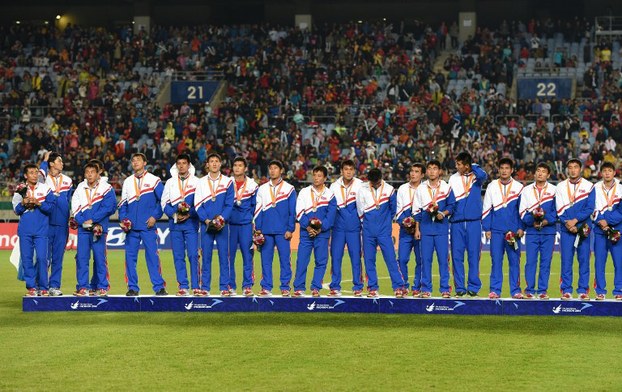North Korea looks to athletes to boost revenue for regime
| Publisher | Radio Free Asia |
| Publication Date | 18 November 2016 |
| Cite as | Radio Free Asia, North Korea looks to athletes to boost revenue for regime, 18 November 2016, available at: https://www.refworld.org/docid/58481218c.html [accessed 21 May 2023] |
| Disclaimer | This is not a UNHCR publication. UNHCR is not responsible for, nor does it necessarily endorse, its content. Any views expressed are solely those of the author or publisher and do not necessarily reflect those of UNHCR, the United Nations or its Member States. |
2016-11-18
 Members of the North Korean men's soccer team pose on the podium following their loss to South Korea in the gold medal match of the 17th Asian Games in Incheon, Oct. 2, 2014. AFP
Members of the North Korean men's soccer team pose on the podium following their loss to South Korea in the gold medal match of the 17th Asian Games in Incheon, Oct. 2, 2014. AFP
Increasingly constrained by international sanctions imposed as a punishment for nuclear tests and missile launches, North Korea is now looking to its athletes in sports such as soccer, table tennis, and Taekwondo to earn money abroad to help fund the running of the isolated, one-party state, sources in the country's capital say.
The move reflects a shift away from the deployment of North Korean workers to other countries to earn cash for the regime, a source in Pyongyang told RFA's Korean Service.
"It's hard to earn foreign currency by sending workers abroad, since the international community has begun criticizing this practice as a form of slave labor," RFA's source said, speaking on condition of anonymity.
"Therefore, the North Korean government is putting more effort into sending athletes and coaches with good records to take part in international competitions," the source said.
While laborers sent abroad to work can earn on average about $100 to $500 a month, an athlete with a strong history of performance can earn hundreds of thousands of dollars in initial contract payments, annual salary, and payment for games, RFA's source said.
"For this reason, the government has now focused on developing human resources connected with sports," he said.
"Sending members of sports clubs to other countries is not restricted by sanctions, as it is claimed that this only promotes nongovernmental sports exchanges," a second Pyongyang source with connections to a North Korean sports club said.
"And the large amounts of foreign currency earned by athletes and coaches is then used to support [North Korean leader] Kim Jong Un's governing fund," the source said.
Taekwondo, a Korean martial art, has also drawn in revenue, with instructors sent abroad to earn funds used to recruit foreign coaches for North Korean ball clubs and fund training in the off-season overseas, he said.
"Taekwondo instructors have earned more than $10,000 at demonstration events, and North Korea has entered into negotiations to send athletes and coaches [in other sports] to India, Bulgaria, and other countries, as well as China," he said.
Other countries engaged in talks with North Korea on sports exchanges include Libya, Cambodia, Laos, and the Czech Republic, he added.
North Korea has brought most of its recent Olympic medals in weightlifting and shooting, but its under-20 and under-17 women's soccer teams are also strong international contenders.
Reported by Jieun Kim for RFA's Korean Service. Translated by Soo Min Jo. Written in English by Richard Finney.
Link to original story on RFA website
